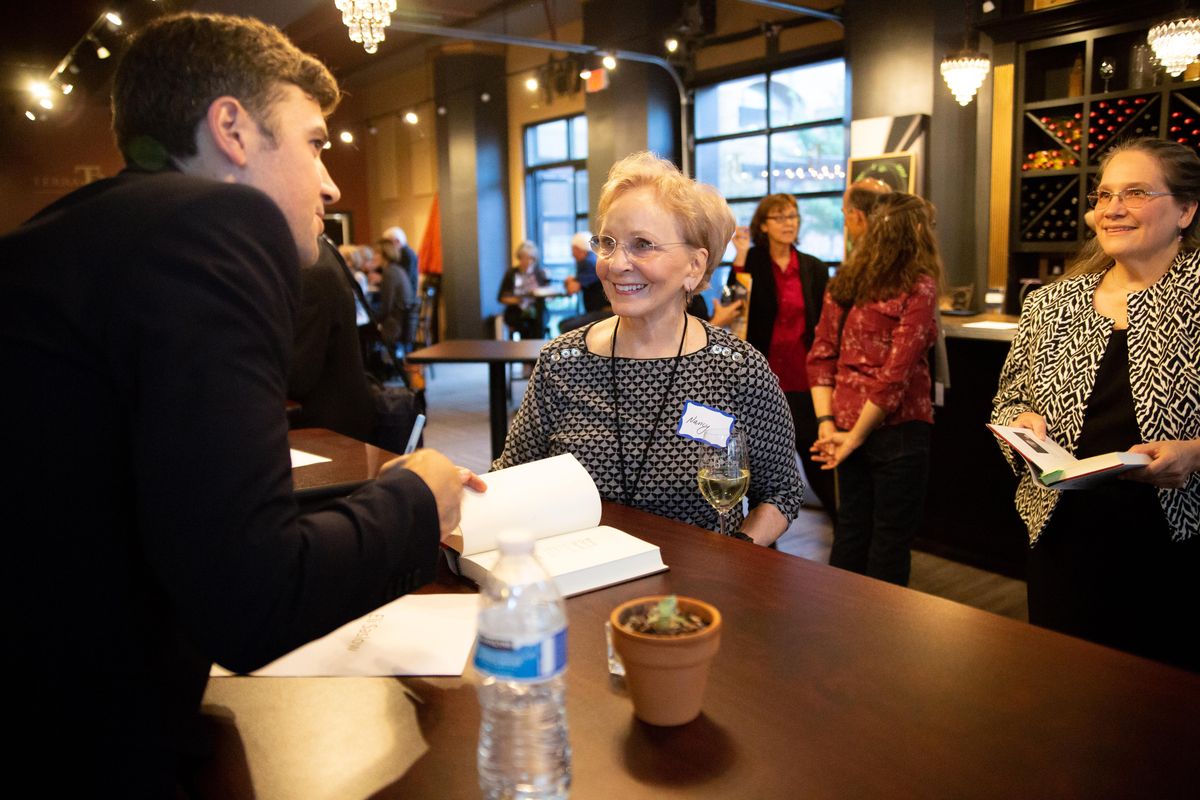Author Eli Saslow tells Northwest Passages crowd that white nationalism can be defeated with community

It takes a village to sway a white nationalist.
That’s the moral of the story of Derek Black, the anointed heir of the movement whose tale of repudiation should give modern America hope, author Eli Saslow told an audience from the Northwest Passages Book Club stage Monday night.
“I think the relationships really helped Derek begin to encounter these other truths,” Saslow said.
Saslow’s book, “Rising out of Hatred: The Awakening of a Former White Nationalist,” tells of Black’s time at New College of Florida in Sarasota. The godson of prominent Ku Klux Klansman David Duke leaves the beliefs of his family behind as colleagues slowly, but persuasively, chip away at the prejudice that was instilled in him at birth.
That includes sitting down to break bread with an Orthodox Jew at weekly dinners held on the campus. Those dinners also led Black to find love in Allison, a classmate who challenged his beliefs and even agreed to attend a white nationalist rally in the woods of Tennessee as an undercover operative.
“She was not only his girlfriend, but his conscience,” Saslow said of Allison.
The book, which grew out of a piece Saslow wrote in October 2016 as a staffer at the Washington Post, makes note of the political developments at the beginning of this decade that gave rise to a resurgence of alt-right and neo-Nazi ideologies in the American public sphere, including the far right’s response to the presidency of Barack Obama and the embrace of President Donald Trump by Duke and others.
Saslow took a break Monday night from a national media tour that has included appearances on the “Today” show and “The Daily Show with Trevor Noah” to talk about the book, and what it means for our national discourse, to a crowd of a couple hundred people who filled the first floor of the Chronicle building.
Black didn’t initially want to speak with Saslow, the author said. He’d stumbled upon the former white nationalist’s story while researching Dylann Roof, the gunman who killed nine black parishioners at an Episcopal church in Charleston, South Carolina, in June 2015. Saslow was reading the internet message board, Stormfront, that was started by Black’s father, Don, to learn as much as he could about the hatred that inspired the shootings. But users were coming to grips with Black’s public defection, and Saslow knew there was another story to tell.
“Now, people on this message board were speculating about what had happened, where he was, and what they would do once they found him,” Saslow said. “So, as soon as I finished writing about Dylann Roof, I also wanted to try and find Derek Black.”
It wasn’t easy. Black had changed his name and was attending a new school. The initial request for an interview was turned down, but Saslow said it was the changing political climate, and the return of racist ideology, that prompted Black to reconsider.
“Derek began to see, in late 2015 and 2016, he began to see all these seeds that he’d planted, these seeds of really divisive rhetoric, he began to see it in really prominent areas, and growing all around him,” Saslow said. “I think that made him feel in small ways culpable, and in large ways terrified.”
The book borrows heavily from internet message boards, text chat threads and social media posts to dive into the lives of the students trying to sway Black from not only his ideology, but his heritage. Saslow read page after page of posts on Stormfront, and listened to many of Black’s radio shows with his father, a task that he said was both difficult and terrifying.
“Luckily for me, I only had to do it for a year, or a year and a half, and then leave it,” he said. “Unfortunately for me, the scary thing now, looking at where we’re at, these ideas and this rhetoric has become really difficult for us to leave, because we’re all marinating in it now.”
Joining Saslow on the Northwest Passages stage Monday night was Edward Humes, a nonfiction author who has written about the military, the education system and – most recently – “Door to Door,” a book about the modern transportation system.
Saslow told the crowd he hoped the actions of Black’s classmates, and their success in changing deeply ingrained beliefs, would inspire them to combat racism where they saw it. Those students at a small liberal arts college in Florida provided a blueprint for battling hatred.
“Real transformation is possible,” Saslow said. “If the future heir of the white nationalist movement can wind up really far on the other side, as a prominent anti-racist activist, then I hope we can all affect change with the people in our lives who hold much more subtle beliefs.”